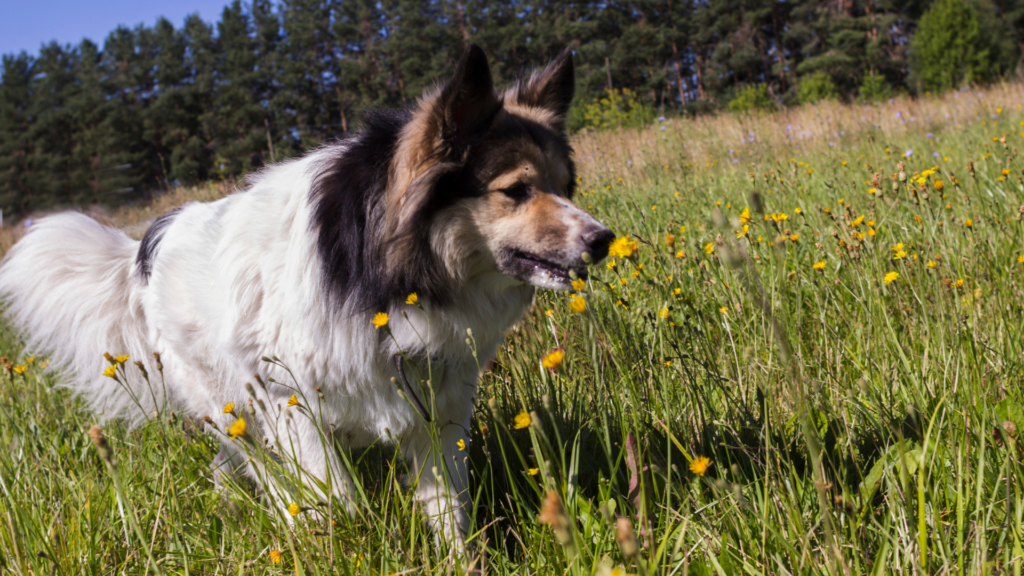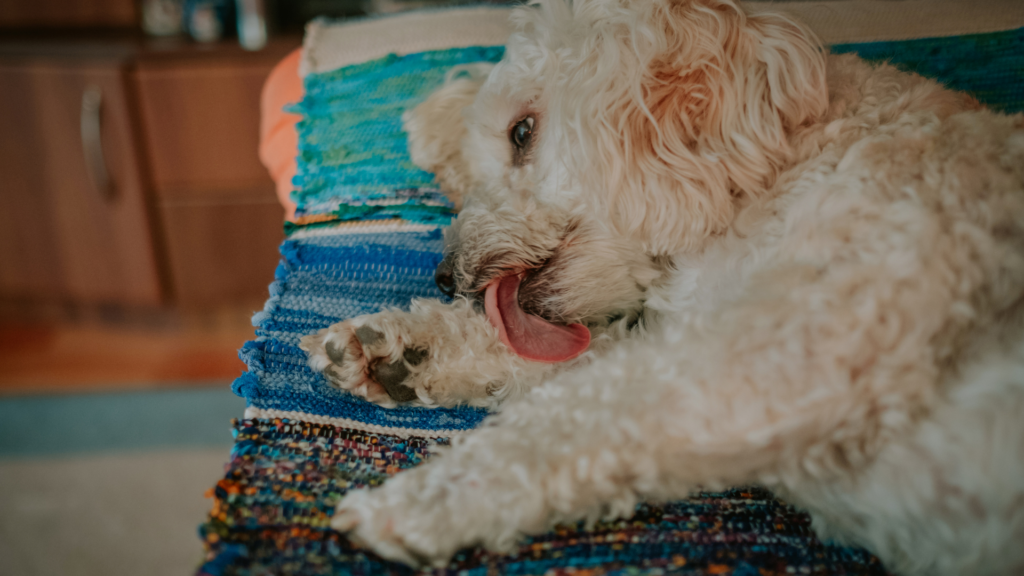Itching, sneezing, feeling just all-around-uncomfortable – the same tough-to-bear allergy symptoms you experience from time to time can affect your pet, too! However, while allergies can impact pets seasonally, they can also occur year-round due to a number of causes – from environmental changes, to food ingredients, and more.
But identifying the cause of your dog’s allergies isn’t as simple as it might be for humans. First you need to understand the common causes of allergies in pets, then know how to spot the symptoms, and what to do to help offer your pup some relief so they can start feeling like themselves again.
Contents
What Causes Allergies in Dogs?

Unfortunately, allergies are very common in dogs, and begin to show up once a dog matures past one or two years of age. There can be a number of causes, which the experts at VCA Veterinary Hospitals break down into several categories:
- Flea allergy: Reaction to a flea bite or flea dirt
- Food allergy: Reaction to something the dog ingested
- Inhalant allergy, atopy or seasonal allergy: Reaction to breathing in an allergen (like dust, mold, pollen, etc.)
- Skin contact allergy: Reaction to something in contact with your dog’s skin. This can be something from outside, like a tree or grass pollen, or can be from something as simple as a laundry detergent that was used in your dog’s bedding.
While it can be tough to narrow exactly what is causing your pet’s allergies, start with the process of elimination. Ask yourself some questions: Did you change laundry detergent or cleaning products? Did you recently move and have environmental changes (like new trees and pollen)? Did you switch your dog’s food? Take notes and use the process of elimination to rule out potential causes, and always consult your vet to help identify the root cause.
How to Spot Allergies

Any good dog owner can tell a change in behavior in their pup, but sometimes allergies can be tricky to identify.
A few telltale signs of an allergic reaction include excessive itching, constant licking (especially of the paws), sneezing, and runny eyes. Keep an eye on your pet and if any of these habits have noticeably increased, schedule a trip to the vet to help with finding the cause and appropriate treatment.
How to Treat Allergies in Dogs

As American Kennel Club explains, treatment of allergies depends entirely on your dog’s type of allergy. For example, the best way to treat flea allergy dermatitis is to kill the fleas, while the best way to treat a food allergy is a change in diet.
It’s always best to consult your vet for their expert opinion, and for immediate relief, they can help with topical remedies and even by administering a vaccine (like Cytopoint) to stop the itching. And in the meantime, a standard benadryl can be administered every 4 – 6 hours (2-4 milligrams per pound of their body weight) to provide instant at-home relief,
When to Call an Emergency Vet
While minor environmental and seasonal allergies can be managed at home, and with a few helpful products from the vet, acute allergic reactions should not be ignored.
Bee stings, vaccine reactions, and ingesting something harmful (like a chemical, cleaning product, or other poisons) can cause anaphylactic shock in dogs, which can be fatal if not immediately treated. Signs of severe allergic reactions include hives, swelling of the face, throat, lips, eyelids, or earflaps, excessive vomiting, and decreased heart rate.
If you believe your pet is experiencing an acute allergic reaction, call your emergency vet or the Animal Poison Control hotline immediately.



I know my dog is allergic to something in her food but when I try another brand she turns her nose up at it. I feed her Caesar’s brand mixed with some raw beef. She loves it. She does chew her paws and has a few break outs of bumps on her skin. Is benedryl an option?
Try it , but if she is allergic to some ingredient in Cesar then is going to be useless , I feed mine from a company called Raw Paws frozen green tripe is raw super food and no allergies , I have 4 pomms and 2 are very sensitive , I use Nellie’s laundry detergent because of its purity. Good luck allergies are horrible I have gone several times to the hospital because of them.
Depending on the age of your little one, I can tell you from my experience with my last girl (Winnie) that at a certain age level about eight years old sometimes too much protein will create a lot of licking of the paws, redness, and more bumps.
With my present(Daisy) she is actually allergic to chicken. The vet suggested taking her off of all poultry. I now use freeze dry, raw, kibble, and gently cooked from Stella and Chewy. Daisy had no problems transferring over to this gently and loves every bit of it has very little problems now with dry skin and hair loss.
Therefore, I am not giving her any more medication’s
One more suggestion, I have also taken her off of all internal flea medication as side effects. Have all allergic reactions to skin and hair loss. She is on a topical Natural Defense by Sentry. It smells like like a pine forest because it’s all natural.
Hope this all helps
All I get from going to the vet are large bills with prescription medication, no diagnoses. My point: going to the vet, for the most part, does that give beneficial results.